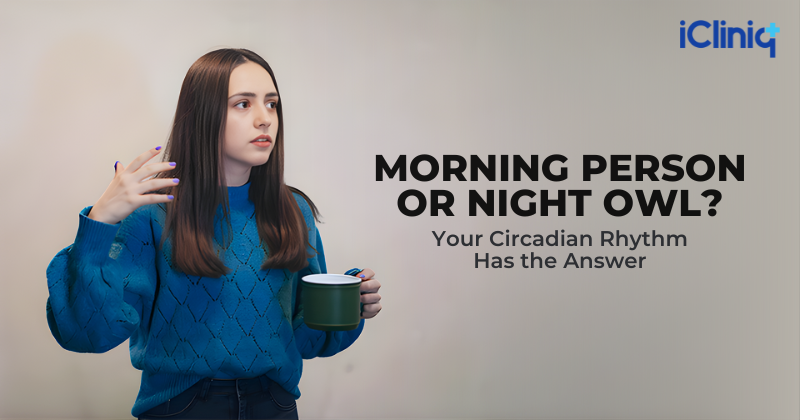Morning Person or Night Owl? Your Circadian Rhythm Has the Answer

Your inherent circadian sleep-wake rhythm is more than customary; it's a biotypical signature based on genes, hormones, and the environment around you. Recognizing if you're a lark, the day-glo person, or an owl, the nocturnist, can be an intellectual prediction to make better decisions with your energy, mood, physical health, and cognitive productivity.
Your Circadian Rhythm Evolves With Age and Personal Biology
Your natural rhythm may change every ten years, and your tendency to be a morning person or an evening person may also develop over time as you get older. Some people also have genetics that make their internal clock more or less sensitive to light, which affects how quickly they can adjust their sleep-wake cycle when routines or environments shift.
Night owls often have a slightly longer internal day, which makes staying up late easy and waking early biologically difficult.
Your Gut, Hormones, and Body Temperature Influence Energy and Alertness
Your gut microbiome can affect when you feel most awake. Certain bacteria activate metabolic pathways earlier or later in the day, creating unintentional shifts in peak energy and focus. Core body temperature also plays a major role, and the timing of its rise or fall can determine when you think faster, respond more sharply, and perform mentally at your best.
Hormone fluctuations like melatonin also differ. Morning chronotypes usually have steadier hormonal timing, resulting in more predictable energy across the day.
Chronotype Shapes How the Body Processes Fuel and Hunger
Morning and evening chronotypes metabolize carbohydrates and fats differently depending on the time of day. These differences may influence appetite patterns, cravings, and how efficiently the body uses fuel. As a result, eating at times misaligned with your natural rhythm can affect energy stability, digestion, and even weight-management efforts.
Creativity, Focus, and Emotional Stability Follow Circadian Timing
Cognitive performance is tied closely to the circadian cycle. Morning types often perform structured, problem-solving tasks best earlier in the day, while night owls tend to excel in creative thinking during later hours.
When lifestyle demands are not aligned with an individual's natural rhythm, stress hormones such as cortisol can fluctuate irregularly, leading to emotional fatigue, irritability, and reduced stress tolerance.
Sleep Rhythm Alignment Can Influence Relationships and Social Well-being
A mismatch between chronotypes may lead to what is known as social jet lag. Partners with opposite sleep-wake preferences may struggle to find shared time and energy for connection and routines. Without intentional adjustments and scheduled communication, this mismatch can slowly affect relationship rhythm, emotional bonding, and shared lifestyle habits.
Circadian sleep-wake rhythm isn't discipline; it's biology determining your best hours. Working closely with your internal clock can unravel better attention, concentration, restfulness in sleep, and a daily routine that is less taxing on mind and body.





